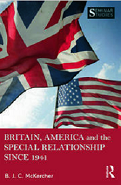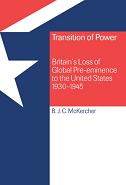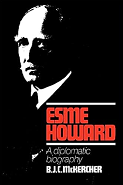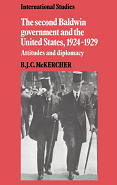Dr. Brian McKercher

Position
Contact
Credentials
BA, MA (UofA), PhD (London School of Economics)
Area of expertise
World. The foreign policies of the Great Powers since 1815; 19th and 20th Century British foreign policy; and 19th and 20th Century American foreign policy.
Bio
I received my PhD in modern international history, under the supervision of Professor D. Cameron Watt, from the London School of Economics in 1979. My dissertation focussed on the Anglo-American relationship in the latter half of the 1920s. After working in government, I subsequently taught at the University of Alberta (1982-1987) and the Royal Military College of Canada (1987-2014). I was the Chair of War Studies at RMC from January 1997 to December 2006 and, since September 2007, I have been the editor of the British learned journal, Diplomacy & Statecraft. I am the general editor of The Praeger Series on Diplomacy and Strategic Thought; and with K.E. Neilson, I am the general editor of The Praeger Series on Foreign Policy in the Interwar Period. My areas of specialisation encompass the foreign policies of the Great Powers since 1815 and 19th and 20th Century British and American foreign policy.
Selected publications
Books
 |
 |
 |
 |
- Britain, America, and the Special Relationship since 1941 (Abingdon: Routledge, 2017), 205 pp.
- Transition of Power: Britain’s Loss of Global Preeminence to the United States, 1930-1945 (Cambridge: Cambridge University Press, 1999), pp. 402.
- Esme Howard: A Diplomatic Biography (Cambridge: Cambridge University Press, 1989), pp. 482.
- The Second Baldwin Government and the United States, 1924-1929: attitudes and diplomacy (Cambridge: Cambridge University Press, 1984), pp. 271.
Edited Books
- The Routledge Handbook of Diplomacy and Statecraft, Second Edition (Abingdon: Routledge, 2022), pp. 456.
- With Erik Goldstein, co-editor, Aspects of British Policy and the Treaty of Versailles: Of War and Peace (London, Routledge, 2020), pp. 256.
- With Antoine Capet, co-editor, Winston Churchill: At War and Thinking of War before 1939 (London: Routledge, 2019), 205pp.
- editor, The Handbook of Diplomacy and Statecraft (London: Routledge, 2011), 489 pp.
- with M.A. Hennessy, eds., War in the Twentieth Century. Reflections at Century’s End (Westport, CT: Praeger, 2003), 245 pp.
- with E. Goldstein, eds., Power and Stability. British Foreign Policy, 1865-1965 (London: Frank Cass, 2003), pp.348.
- with R. Legault, co-editor, Military Planning and the Origins of the Second World War in Europe (Westport, CT: Praeger, 2000), pp. 208.
- with M.A. Hennessey, co-editor, The Operational Art: Developments in the Theory of War (Westport, CT: Praeger, 1997), pp. 220.
- with L. Aronsen, co-editor, The North Atlantic Powers in a Changing World: Anglo-American-Canadian Relations, 1903-1956 (Toronto: University of Toronto Press, 1996), pp. 298.
- with Michael Dockrill, co-editor, Diplomacy and World Power: Studies in British Foreign Policy, 1890-1951 [a festschrift for Zara Steiner on her retirement] (Cambridge: Cambridge University Press, 1996), pp. 271.
- with A.H. Ion, co-editor, Military Heretics: studies in the unorthodox in military leadership (Westport, CT: Praeger, 1993), pp. 246.
- with K.E. Neilson, co-editor, Go Spy the Land: Military Intelligence in History (Westport, CT: Praeger, 1992), pp. 205.
- editor, Arms Limitation and Disarmament, 1899-1939: restraints on war (Westport, CT: Praeger, 1992), pp. 248
- editor, Anglo-American Relations in the 1920s: the struggle for supremacy (London and Edmonton: Macmillans and the University of Alberta Press, 1991), pp. 242.
- with E.J. Errington, co-editor, The Vietnam War as History (New York: Praeger, 1990), pp. 196.
- with D.J. Moss, co-editor, Shadow and Substance in British Foreign Policy, 1895-1939. Essays in honour of the late Professor C.J. Lowe (Edmonton: University of Alberta Press, 1984), pp. 280.
Selected Articles
- ‘Catholicism and Foreign Policy: Esme Howard and British Policy towards Poland, 1919’, Diplomacy & Statecraft, 32/2(2021), 289-309.
- ‘The Other German Treaty: Lloyd George and St Germain, 1919/20‘, Beiträge zur Rechtsgeschichte Österreichs, 9/2(2019), 320-31.
- with Erik Goldstein, ‘Introduction: Of War and Peace: Aspects of British Policy and the Treaty of Versailles’, Diplomacy & Statecraft, 30/2(2019), 194-200.
- ‘The Quest for Stability: British War Aims and Germany, 1914–1918’, Diplomacy & Statecraft, 30/2(2019), 201-27.
- ‘Anschluss: The Chamberlain Government and the First Test of Appeasement, February–March 1938’ International History Review, 39/2(2017), 274-94.
- ‘Kanada’, in E.A. Schmidl, hrsg., ‘Was sagt uns der Erste Weltkrieg heute? Führende Militärhistoriker aus 21 Staaten berichten‘, ISS Aktuell, 3(2014), p. 8.
- ‘Canada and the Second World War’ [Review article], Cercles. Revue Pluridisciplinaire du Monde Anglophone [(February 2014], 8,433 words: http://www.cercles.com/review/r70/Hayes.html
- ‘National Security and Imperial Defence: British Grand Strategy and Appeasement, 1930-1939’, Diplomacy & Statecraft, 19(2008), 391-442.
- ‘The Continental Commitment and British Foreign Policy: the Field Force and the Strategy of the National Government, 1933-1938’, English Historical Review, 123(2008), 98-131.
- ‘“A Certain Irritation”: the White House, the State Department, and Naval Arms Limitation, 1927-1932’, Diplomatic History, 31(2007), 829-63.
- With S. Enjamio, ‘“Brighter Futures, Better Times”: Britain, the Empire, and Anglo-American Economic Competition in Cuba, 1898-1920’, Diplomacy & Statecraft, 18(2007), 663-87.
- ‘The Foreign Office, 1930-1939: Strategy, Permanent Interests, and National Security’, Contemporary British History, 18(2004), 87-109.
- ‘Austen Chamberlain and the Continental Balance of Power: Strategy, Stability, and the League of Nations, 1924-29’, Diplomacy and Statecraft, 14(2003), 207-36.
- with Erik Goldstein, ‘Power and Stability in British Foreign Policy, 1865-1965’, Diplomacy and Statecraft, 14(2003), 1-22.
- with Catherine Krull, ‘The Press, Public Opinion, Arms Limitation, and Government Policy in Britain, 1932-1934: Some Preliminary Observation’, Diplomacy and Statecraft, 13(2002), 103-36.
- with M.L. Roi, ‘“Ideal” and “Punch-Bag”: Conflicting Views of the Balance of Power and Their Influence on Interwar British Foreign Policy’, Diplomacy and Statecraft, 12(2001), 47-78.
- ‘From Disarmament to Rearmament: British Civil-Military Relations and Policy-Making, 1933-1936’, Defence Studies, 1(2001), 21-48.
- ‘Reckoning with the Myth of the American Expeditionary Force: The United States and the Allied War Coalition, 1917-1918’, Reviews in American History, 23(1995), 284-89.
- ‘The Last Old Diplomat: Sir Robert Vansittart and the Verities of British Foreign Policy, 1903-1930’, Diplomacy and Statecraft, 6/1(1995), 1-38.
- ‘The Paths of Reason and Peace: Esme Howard’s Unpublished Manuscript on "Paderewski. Musician – Patriot – Statesman"‘, Jahrbücher für Geschichte Osteuropas, 41(1993), 81-100.
- ‘"No Eternal Friends or Enemies": British Defence Policy and the Problem of the United States, 1919-1939’, Canadian Journal of History, 28(1993), 257-93.
- ‘The Politics of Naval Disarmament in Britain in the 1920s’, Diplomacy and Statecraft, 4/3(1993), 35-59.
- ‘From Enmity to Cooperation: the second Baldwin government and the improvement of Anglo-American relations, November 1928-June 1929’, Albion, 24(1992), 64-87.
- ‘The Richness and Diversity of International History: the new "Guides to Research and Research Materials"‘, Canadian Journal of History, 27(1992), 521-31.
- ‘Reaching for the Brass Ring: recent historiography of American foreign relations in the interwar period’, Diplomatic History, 15(1991), 565-98.
- ‘"Our Most Dangerous Enemy": Great Britain Pre-eminent in the 1930s’, International History Review, 13(1991), 751-83.
- ‘Diplomatic Equipoise: The Lansdowne Foreign Office, the Russo-Japanese War of 1904-1905, and the global balance of power’, Canadian Journal of History, 24(1989), 299-340.
- ‘Wealth, Power, and the New International Order: Britain and the American Challenge in the 1920s’, Diplomatic History, 12(1988), 411-41.
- ‘"A dose of fascismo": Esme Howard in Spain, 1919-1924’, International History Review, 9(1987), 555-85.
- ‘Belligerent Rights in 1927-1929: Foreign Policy Versus Naval Policy in the Second Baldwin Government’, Historical Journal, 29(1986), 963-74.
- ‘A Sane and Sensible Diplomacy: Austen Chamberlain, Japan, and the Naval Balance of Power in the Pacific Ocean, 1924-1929’, Canadian Journal of History, 21(1986), 187-213.
- with K.E. Neilson, ‘"The Triumph of Unarmed Forces": Sweden and the Allied Blockade of Germany, 1914-1917’, Journal of Strategic Studies, 7(1984), 178-99.
- ‘Austen Chamberlain’s Control of British Foreign Policy, 1924-1929’, International History Review, 6(1984), 570-91.
- ‘A British View of American Foreign Policy: The Settlement of Blockade Claims, 1924-1927’, International History Review, 3(1981), 358-84.
Selected Chapters
- ‘Herbert Hoover, Franklin Roosevelt, Ramsey MacDonald, Stanley Baldwin and Neville Chamberlain: The Amelioration of Anglo-American Rivalry’, in Michael Patrick Cullinane and Martin Farr, eds., The Palgrave Handbook of Presidents and Premiers: From Cleveland and Salisbury to Trump and Johnson, 1895 (Houndmills: Palgrave Macmillan, 2022), 101-32.
- ‘Prologue: Diplomacy and Statecraft in an Era of Increasing International Anarchy’, in B.J.C. McKercher, editor, The Routledge Handbook of Diplomacy and Statecraft, Second Edition (Abingdon: Routledge, 2022), xxi-xxxiii.
- ‘Catholicism and Foreign Policy: Esme Howard and British Policy towards Poland, 1919’, inn T.G. Otte, ed., Studies in Diplomacy and Statecraft. Essays in Honour of Erik Goldstein (Abingdon: Routledge, 2022), 289-309.
- ‘Chrysalis of Power: American Foreign Policy, 1919-1941’, in Christopher Dietrich, ed., A Companion to U.S. Foreign Policy, Colonial Era to the Present, Volume I (New York: John Wiley & Sons, 2020), 345-81.
- with Erik Goldstein, ‘Introduction: Of War and Peace: Aspects of British Policy and the Treaty of Versailles’, in B.J.C, McKercher and Erik Goldstein, eds., Of War and Peace: Aspects of British Policy and the Treaty of Versailles (London: Routledge, 2020), 1-7.
- ‘The Quest for Stability: British War Aims and Germany, 1914-1918’, in B.J.C, McKercher and Erik Goldstein, eds., Of War and Peace: Aspects of British Policy and the Treaty of Versailles (London: Routledge, 2020), 8-34.
- ‘The Democratization of Central and Eastern Europevas a British Strategic Objective, 1918–1925/Die Demokratisierung der Mittel-und Osteuropa als britischer Ideal nach dem Ersten Weltkrieg’, in H. Rumpler, and U. Harmat, eds., Die Habsburgermonarchie 1848-1918, Bd. XII: Bewältigte Vergangenheit? Die nationale und internationale Historiografie zum Untergang der Habsburgermonarchie als ideelle Grundlage für die Neuordnung Europas (Wien: Kommission für die Geschichte der Habsburgermonarchie, 2018), 331-58.
- With Antoine Capet, ‘Introduction. Winston Churchill: At War and Thinking of War before 1939”, in B.J.C. McKercher and Antoine Capet, eds., Winston Churchill: At War and Thinking of War before 1939 (London, Routledge: 2019), 1-14.
- ‘The Limitations of the Politician-Historian: Winston Churchill, rearmament, appeasement, and the origins of the Second World War’, in B.J.C. McKercher and Antoine Capet, eds., Winston Churchill: At War and Thinking of War before 1939 (London: Routledge, 2019), 127-52.
- ‘Economic Warfare’, in Hew Strachan, ed., Oxford Illustrated History of the First World War, New Edition (Oxford: Oxford University Press, 2014), 119-133.
- ‘Strategy and Foreign Policy in Great Britain, 1930-1938: From the Pursuit of the Balance of Power to Appeasement’, in Christopher Baxter, M.L. Dockrill, and Keith Hamilton, ed., Britain in Global Politics, Volume I: From Gladstone to Churchill, 1900-1945 (London: Palgrave, 2013), 153-74.
- ‘The War Office and the British Army Field Force: Building for the Continental Commitment, 1933-1939’, in Harold Raugh, editor, Past Through Present: Thoughts on Military History at the Strategic, Operational, and Tactical Levels of War (Vienna: Heeresgeschichtlichen Museums, 2013), 121-36.
- ‘Prologue: The International Order and the New Century’, in B.J.C. McKercher, ed., The Handbook of Diplomacy and Statecraft (London: Routledge, 2011), ix-xxviii.
- with K.E. Neilson, ‘"The Triumph of Unarmed Forces": Sweden and the Allied Blockade of Germany, 1914-1917’, in Andrew Lambert, ed., Naval History 1850-Present, Volume I (Aldershot: Ashgate, 2007), 449-70.
- ‘From Isolation to Intervention: Anglo-Canadian Defence Relations from the Canadian Perspective, 1935-1939’, in R.S. Rush and W.W. Epley, eds., Multinational Operations, Alliances, and International Military Cooperation (Washington, DC: Center of Military History, United States Army, 2006), 85-91.
- ‘The Foreign Office, 1930-1939: Strategy, Permanent Interests, and National Security’, in G. Johnson, ed., The Foreign Office and British Diplomacy in the Twentieth Century (London: Routledge, 2005), 87-109.
- ‘The Limitations of the Politician-Strategist: Winston Churchill and the German Threat, 1933-1939’, in John Maurer, ed., Churchill and Strategic Dilemmas Before the World Wars. Essays in Honor of Michael I. Handel (London: Frank Cass, 2003), 88-120.
- ‘Austen Chamberlain and the Continental Balance of Power: Strategy, Stability, and the League of Nations, 1924-29’, in E. Goldstein and B.J.C. McKercher, eds., Power and Stability. British Foreign Policy, 1865-1965 (London: Frank Cass, 2003), 207-36.
- with Erik Goldstein, ‘Power and Stability in British Foreign Policy, 1865-1965’, in E. Goldstein and B.J.C. McKercher, eds., Power and Stability. British Foreign Policy, 1865-1965 (London: Frank Cass, 2003), 1-22.
- ‘Cold War North Atlantic Triangle: Canada, Great Britain, and the United States, 1945-1990’, in A. Capet, ed., The ‘Special Relationship’. La <<relation spéciale’’ entre le Royaume-Uni et les États-Unis (Rouen: University of Rouen Press, 2003), 137-67.
- ‘The Canadian Way of Warfare, 1939-1945’, in B. Horn, ed., Forging a Nation: Perspectives on the Canadian Military Experience (St Catherines, Ontario: Vanwell Publishing, 2002), 123-34.
- ‘Reaching for the Brass Ring: The Recent Historiography of Interwar American Foreign Relations’, in Michael J. Hogan, ed., Paths to Power: The Historiography of American Foreign Relations to 1941 (Cambridge: Cambridge University Press, 2000), pp.176-223.
- ‘Lost Opportunities; The Diplomacy of "Isolationism" in the 1930s’, in Jonathan M. Nielson, ed., Speculations on American Foreign Policy and Diplomatic History: Interests, Ideals, and Power (Westport, CT: Praeger, 2000), 67-107
- ‘Toward the Post-War Settlement: Winston Churchill and the Second Quebec Conference’, in D.L. Woolner, ed., The Second Quebec Conference Revisited; Waging War, Formulating Peace: Canada, Great Britain, and the United States, 1944-1945 (New York: St. Martin’s Press and the Franklin D. Roosevelt Presidential Library, 1998), 17-48.
- ‘Economic Warfare’, in Hew Strachan, ed., Oxford Illustrated History of the First World War (Oxford: Oxford University Press, 1998), 119-133.
- ‘The League of Nations and the Problem of Collective Security, 1919-1936’, in U.M. Rüser, ed., The League of Nations, 1920-1946. Organization and Accomplishments (Geneva: the United Nations Library/League of Nations Archives, 1996), 66-73.
- ‘Old Diplomacy and New: The Foreign Office in the Interwar Period’, in Dockrill and McKercher, Diplomacy and World Power, 79-114.
- ‘World Power and Isolationism: the North Atlantic Triangle and the crises of the 1930s’, in McKercher and Aronsen, North Atlantic Powers, 110-46.
- ‘Churchill, the European balance of power, and the USA’, in R.A.C. Parker, ed., Sir Winston Churchill. Studies in Statesmanship (London: Brasseys, 1995), 42-64.
- ‘The Politics of Naval Arms Limitation in Britain in the 1920s’, in Erik Goldstein and John Maurer, eds., The Washington Conference, 1921-22. Naval Rivalry, East Asian Stability and the Road to Pearl Harbor (London: Frank Cass, 1994), 35-59.
- ‘"Shield of Memory": the memoirs of the British Foreign-Policy-Making Elite, 1919-1939’, in G.W. Egerton, ed., Political Memoir: Essays on the Politics of Memory (London: Frank Cass, 1994), 188-206.
- ‘Of Horns and Teeth: the Preparatory Commission and the World Disarmament Conference, 1926-1934’, in McKercher, Arms Limitation and Disarmament, 173-201.
- ‘"A greater and higher ideal": Esme Howard, Imperial unity, and Canadian autonomy in foreign policy, 1924-1930’, in Michael Graham Fry, editor, Power, Personalities, and Policies. Essays Honouring D. Cameron Watt (London: Frank Cass, 1992), 107-43.
- ‘Between Two Giants: Canada, the Coolidge Naval Conference, and Anglo-American Relations in 1927’, in McKercher, Anglo-American Relations in the 1920s, pp. 81-124.
- ‘Afterword: Foreign Policy and Military Planning – The Cold War and National Defence, 1945-1960’, in R.G. Haycock and K.E. Neilson, eds., The Cold War and National Defence (New York: Praeger Publishers, 1990), pp.185-93.
- ‘The British Diplomatic Service in the United States and the Chamberlain Foreign Office’s Perception of Domestic America: images, reality, and diplomacy’, in McKercher and Moss, Shadow and Substance in British Foreign Policy, pp. 221-47.
